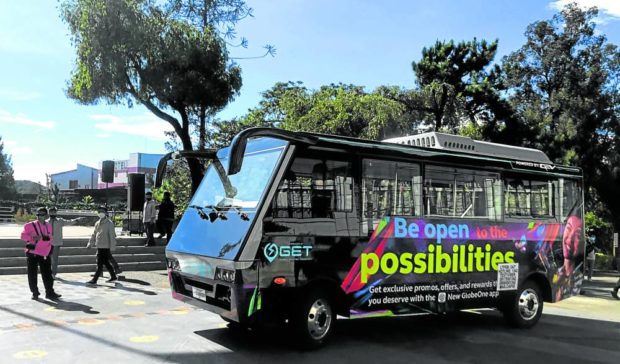
FREE RIDE | The Department of Transportation and the United Nations Development Programme start testing an electric bus, called “Comet,” in Baguio City this week. This e-vehicle will ply the city’s “green routes” and ferry residents for free for two weeks until Dec. 3 to popularize green mass transport. (Photo by VINCENT CABREZA / Inquirer Northern Luzon)
BAGUIO CITY, Benguet, Philippines — The local government here on Monday began testing an electric bus (e-bus) after it was chosen as one of the four cities tasked with piloting electric vehicles in the country, a climate change mitigation measure being pushed by the Department of Transportation (DOTr).
The 18-seat bus, produced by manufacturer Global Electric Transport (GET), drove Mayor Benjamin Magalong through the hilly Bokawkan Road, a few blocks away from City Hall, for the soft launch of the two-week test runs that will officially begin on Nov. 20 until Dec. 3.
Called Comets, the GET buses are powered by lithium ferro phosphate batteries “with a rated energy of 53.47 kilowatts per hour” and will traverse “green routes” that were included in the urban route plan for Baguio, the first city to sign up for DOTr’s Low Carbon Urban Transport initiative in 2019.
Comet is the latest version of the e-vehicle to test its battery and engine power on mountain terrain.
Climate-positive
Previous models of electric-powered minibuses failed to sustain the steep climbs on certain Baguio routes, and the fleet of minibuses, or the so-called modern jeepneys, currently serving some city routes run on conventional fuel.
Aside from Baguio, the cities of Pasig, Sta. Rosa in Laguna province and Iloilo are also pilot-testing electric vehicles.
Urban planner Sara Chavez, who represented Transportation Undersecretary Mark Steven Pastor at the test’s soft launch here, said the DOTr and the United Nations Development Programme (UNDP) intend to popularize electric vehicles as a climate-positive transport alternative in both the public and private sectors.
The results of these tests would shape regulations as well as infrastructure support for e-vehicles, which have been legalized by Republic Act No. 11697 (Electric Vehicle Industry Development Act, or Evida), Chavez said.
According to the UNDP, the country’s transportation sector accounts for 37 percent of the total national energy consumption, and points out that this sector “is one of the consumers of fossil fuels” and is the “fastest-growing source of carbon dioxide emissions.”
Cable cars, too
Carbon emissions have created the so-called greenhouse effect, which traps heat, making the planet warmer and acting as a trigger for extreme weather that has become dangerous to human, animal and plant life.
The promotion of e-vehicles began just as the country deals with skyrocketing and fluctuating world oil prices.
While Comet navigated the steep road, Austrian cable car manufacturer Doppelmayr proposed to the city government a Baguio aerial ropeway transit plan during this week’s executive-legislative assembly.
Cable cars, trams, and electric monorails are among the potential low-carbon urban transport projects considered for Baguio in 2019.